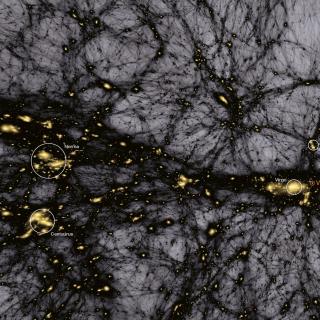Bibcode
Gabrielli, A.; López-Corredoira, M.
Referencia bibliográfica
Physica A, Volume 392, Issue 3, p. 474-484.
Fecha de publicación:
2
2013
Número de citas
8
Número de citas referidas
6
Descripción
The purpose of our study is to understand the mathematical origin in
real space of modulated and damped sinusoidal peaks observed in cosmic
microwave background radiation anisotropies. We use the theory of the
Fourier transform to connect localized features of the two-point
correlation function in real space to oscillations in the power
spectrum. We also illustrate analytically and by means of Monte Carlo
simulations the angular correlation function for distributions of filled
disks with fixed or variable radii capable of generating oscillations in
the power spectrum. While the power spectrum shows repeated information
in the form of multiple peaks and oscillations, the angular correlation
function offers a more compact presentation that condenses all the
information of the multiple peaks into a localized real space feature.
We have seen that oscillations in the power spectrum arise when there is
a discontinuity in a given derivative of the angular correlation
function at a given angular distance. These kinds of discontinuities do
not need to be abrupt in an infinitesimal range of angular distances but
may also be smooth, and can be generated by simply distributing excesses
of antenna temperature in filled disks of fixed or variable radii on the
sky, provided that there is a non-null minimum radius and/or the maximum
radius is constrained.
Proyectos relacionados

Cosmología con Trazadores de la Estructura a Gran Escala del Universo
El Fondo Cósmico de Microondas (FCM) contiene la información estadística de las semillas primigenias que han dado lugar a la formación de todas las estructuras en el Universo. Su contrapartida natural en el Universo local es la distribución de las galaxias que surgen como resultado del crecimiento gravitatorio de aquellas fluctuaciones de densidad
FRANCISCO SHU
KITAURA JOYANES